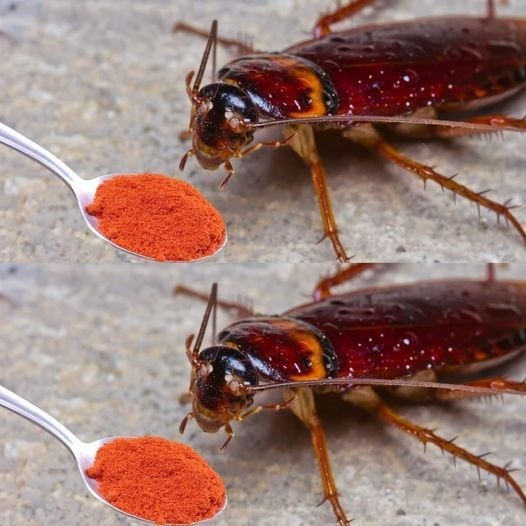ADVERTISEMENT
How to Use:
- For ants: Create a mixture of equal parts vinegar and water and spray it along ant trails and around entry points.
- For fruit flies: Set up a simple trap by placing a small amount of apple cider vinegar in a bowl, covering it with plastic wrap, and poking a few small holes. Fruit flies will be drawn to the scent and become trapped inside.
- For spiders: Wipe down areas where spiders tend to hang out, such as windowsills and corners, with a mixture of vinegar and water to discourage them from returning.
3. Diatomaceous Earth: A Natural Insect Killer
Diatomaceous earth (DE) is a fine powder made from the fossilized remains of tiny aquatic organisms called diatoms. It’s non-toxic to humans and pets but deadly to insects with exoskeletons, such as ants, bedbugs, fleas, and cockroaches. DE works by piercing the exoskeletons of these pests, dehydrating them, and ultimately killing them.
How to Use:
- Sprinkle a thin layer of food-grade diatomaceous earth around the perimeter of your home, focusing on doorways, windows, and other potential entry points.
- For indoor use, lightly dust carpets, baseboards, and any areas where pests are known to gather. Let it sit for a few hours or overnight before vacuuming it up.
4. Citrus Peels: A Natural Deterrent
Citrus fruits like lemons, oranges, and grapefruits have a scent that pests find unpleasant. The natural oils found in citrus peels can help repel pests such as spiders, ants, and mosquitoes.
How to Use:
- Simply place fresh citrus peels near windows, doors, and other entry points where pests might enter.
- For ants, scatter small pieces of lemon or orange peel along their trail.
- Alternatively, you can rub citrus peels on areas where spiders like to build webs.
5. Cinnamon: A Sweet-Smelling Pest Repellent
Cinnamon is not only a delicious spice, but it also works as a natural repellent for ants, cockroaches, and other insects. The strong aroma of cinnamon interferes with insects’ sense of smell, making it harder for them to find food or nesting areas.
How to Use:
- Sprinkle ground cinnamon in areas where ants and other pests tend to gather, such as along windowsills, door frames, and in the pantry.
- You can also place cinnamon sticks in areas prone to spiders or cockroaches to deter them from settling.
6. Bay Leaves: An Easy Pantry Solution
Bay leaves aren’t just for cooking—they can also help keep pests like moths and cockroaches away from your pantry and kitchen. The strong aroma of bay leaves is unpleasant to many insects, particularly pantry pests.
How to Use:
- Place dried bay leaves in your pantry, kitchen cabinets, or any food storage areas to prevent moths and other insects from making a home there.
- For extra protection, place bay leaves inside containers or bags of dry goods, such as flour, rice, and pasta.
7. Cedar: Natural Protection for Closets and Drawers
Cedar is a classic repellent for moths, termites, and other insects. The natural oils in cedar wood have a strong scent that pests dislike, and it’s commonly used in closets and drawers to keep bugs away from clothing and stored items.
How to Use:
- Place cedar blocks, chips, or hangers in your closets and drawers to prevent moths from damaging your clothes and linens.
- If you have cedar planks, you can also place them near your doors and windows to deter pests from entering.
8. Neem Oil: A Natural Pesticide
Neem oil, derived from the seeds of the neem tree, has been used for centuries in natural pest control. It works as both a repellent and a pesticide, affecting the pest’s ability to reproduce and feed.
How to Use:
- Mix neem oil with water and a few drops of dish soap to create an effective spray. Use this solution on plants to keep aphids, mosquitoes, and other pests at bay.
- For outdoor use, spray the mixture around your yard and garden to prevent pests from invading your home.
9. Cloves: A Simple Yet Powerful Insect Repellent
Cloves are another spice that can be used to deter pests. The scent of cloves is particularly effective against flies, mosquitoes, and ants.
How to Use:
- Place whole cloves in small sachets and hang them near windows or in areas where pests are a concern.
- You can also place cloves in areas where you’ve spotted fruit flies or other insects to keep them away.
Final Thoughts
Keeping your home pest-free doesn’t have to mean using harsh chemicals or toxic sprays that can harm your health and the environment. With a little creativity and a few all-natural ingredients, you can effectively protect your home from pests while maintaining a safe, eco-friendly space. From essential oils and vinegar to diatomaceous earth and citrus peels, there are plenty of natural, simple solutions that are not only effective but also kind to your family, pets, and the planet. So the next time you spot an unwelcome visitor, reach for one of these natural remedies and enjoy a pest-free home without the chemicals!
ADVERTISEMENT
